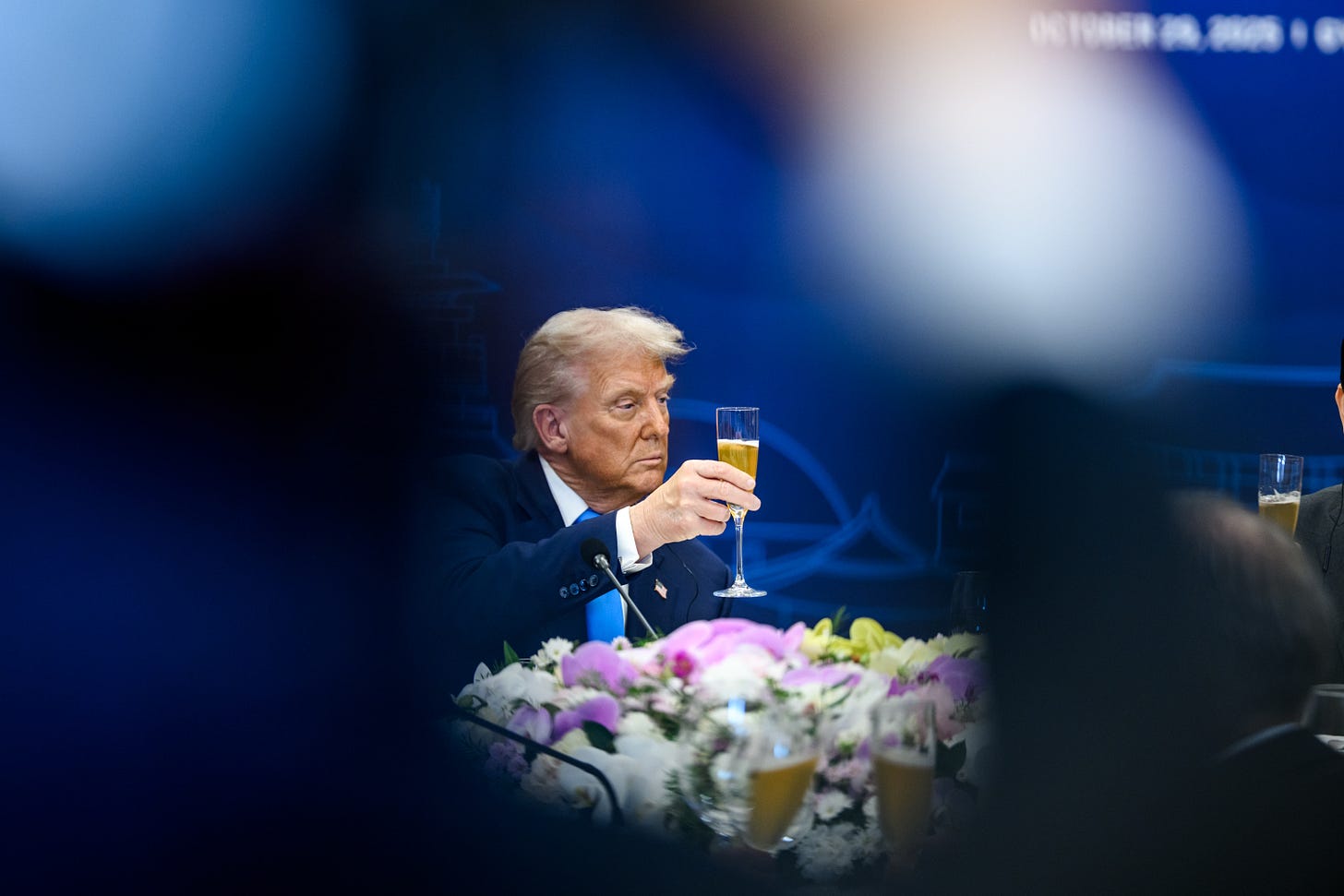As elite complicity with Trumpism grows, a revival of democracy will require a social reckoning
Description

This piece was previously published at The Hot Screen.
In a recent piece at his essential Democracy Americana blog, historian Thomas Zimmer highlights a misconception among journalists and politicos that both feeds Donald Trump’s corrupt rampage across our government and hamstrings the emergence of an opposition strong enough to stop him: that Trump’s election in 2024 provided him with wide latitude to act as he sees fit, up to engaging in a broad swathe of unconstitutional and anti-democratic actions. Zimmer rightly swats down this misconception from a couple directions, noting that every person who voted for Trump was hardly endorsing every bit of his agenda, and also hitting a pretty fundamental point:
Even if we stipulate that everyone who voted for Trump wanted exactly what is happening now, that still would not mean that the Trumpist assault on democratic self-government and the constitutional order is in any way legitimate or deserves deference. He was elected president, and as president, his highest duty is to ensure that the laws of the land be executed faithfully. His job is to uphold the constitutional order, not tear it down and remake it in his image. [ . . .] Democracy does not just mean elections. In widely accepted parlance today, democracy is defined, as a minimum, as a system of institutionalized popular sovereignty that plays by majoritarian rules and treats all citizens as equals. [italics added for emphasis]
As Zimmer suggests, the idea that a president can decide to be a dictator simply because he won the election would be a nonsensical and self-defeating vision of democracy, at odds with our actual governmental structure and centuries of precedent.
One enormous question, then, is why so many elites — not just journalists and elected officials, but also business leaders, university presidents, and others — have so quickly and en masse gotten comfortable with the idea that Donald Trump’s election win lets him do whatever he wants, up to and including subverting future elections? After all, as events of the past year have demonstrated, deference to Trump is increasingly indistinguishable from deference to the establishment of a dictatorship. What sort of American would be OK with this?
One persuasive argument I’ve read, and that draws from the experiences of other democracies that have been dragged into autocracy, is that many people in positions of power will seek to protect what they can, even at the price of sacrificing key values or particular demographics. For instance, we have seen multiple American universities paying Donald Trump what essentially amounts to shake-down money, and moreover agreeing to subject themselves to various forms of government intervention, all in the hope that they will buy protection for most of their operations, professors, personnel, and students. “Better to do this,” you can imagine them thinking, “than to risk having our university punished even more severely, or even shut down.”
Another explanation is offered by Zimmer and others, wherein Trump’s victory is understood to represent the triumph of “real” Americans whose true desires are embodied by Donald Trump. Crudely speaking, Trump can do what he wants because he has a sort of mystical connection with the real will of the American people. You don’t need to look too far under the surface to grasp that these real Americans are those who are white and conservative — in a stereotypical sense, salt of the earth, heartland types who are simply more American than, say, those who live in cities and are more likely to be minorities or naturalized immigrants. The fact that this is actually the belief of Trump and his allies gives this explanation a great deal of weight — it’s not like elites who internalize or defer to it have created this conception of Trump and his authenticity out of whole cloth. And when you consider that those in elite positions in American institutions are disproportionately white, you can see how a theory of Trump’s expansive power that rests in white privilege might gain easier purchase among this layer of American society.
Then there’s the explanation that might seem most obvious, if also most cynical: some of these elites have consented to Trump’s lawlessness either because they agree with it, or, in a slightly more nuanced fashion, they see the benefits as outweighing the harms. We might call this the “greedy, selfish bastards” theory: those with power who highlight the good and downplay the bad of the U.S. descending into authoritarianism, since they see an overall net benefit in terms of personal wealth and privilege.
Crucially, this indifference or even outright hostility to majority rule and the rule of law is likely rooted in what has already been the experience of such elites even before Trump made his first presidential run. The higher up the socioeconomic chain you go, the more you encounter people who are already intimately familiar with the quotidian distortions and corruptions of American democracy and society. They operate in a realm where democracy (as understood in terms of basics like deference to popular opinion, subordination to the public good, and accountability) is often operative or relevant in only a secondary sense. Instead, personal connections, knowledge of the minutiae of arcane laws, and a deep familiarity with the workings of government bureaucracy gain greater prominence. While this is far different from the system of personalist authoritarianism that Trump is pursuing (where the approval or disapproval of Trump himself could determine a supplicant’s fortunes), it’s nonetheless closer on the continuum to what he’s building than many of us would have thought.
It’s close enough, at any rate, that many of those well-versed with insider paths of power have not been shocked by their consciences or by patriotism into denouncing Trump’s moves as alien and un-American. This has also dampened their reaction to Trump’s more direct attacks on the rule of law and democracy that affect ordinary Americans, since they themselves are more accustomed to a system somewhat closer to what Trump is now seeking to impose. At some level, they feel able to navigate the new reality, even if they dislike it — and are indifferent to those who will either fail to prosper or be punished by the new regime.
But just because there are sociological or economic explanations for the lack of elite resistance to Trump is not to excuse them. In a piece looking at the notion of “civic virtue” as understood by the Founders and as it might be understood today, Talking Point Memo’s Josh Marshall zeroes in on a key point that deserves wider acknowledgment and discussion. He notes a recent article by Financial Times columnist Edward Luce, in which a variety of society elites (“lawmakers, private sector executives, retired senior military figures and intelligence chiefs, current and former Trump officials, Washington lawyers and foreign government officials”) told Luce that “Trump would only be restrained by powerful voices opposing him publicly” — yet nearly all declined to speak on the record. Marshall is scathing in his assessment:
[Y]ou profited by this system, this republican system, what you have was made possibly by it. So you have an obligation to defend it when it’s under severe threat. That’s the civic virtue that’s important, that’s real. Needless to say these are





